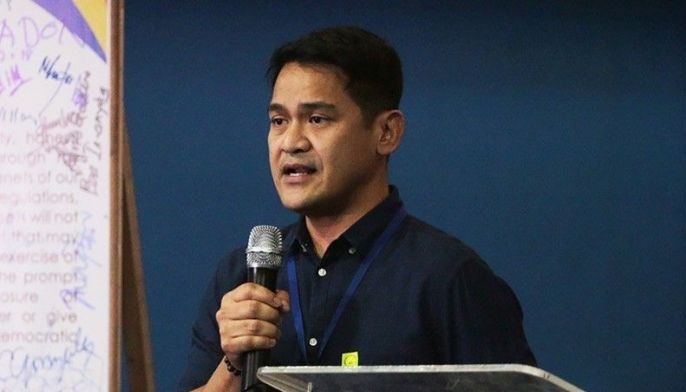MANILA, Philippines (Updated 6:51 a.m., Jan. 30) — Veteran broadcast journalist Jiggy Manicad believes press freedom is not under attack in the Philippines, saying legal action against a news website deemed critical of the government is an isolated case.
Manicad, who is running for senator under the Hugpong ng Pagbabago slate in the May elections, said on ONE News' "The Chiefs" on Monday evening that the government has basis for investigating and filing cases against news website Rappler, adding how the news site "handled" stories might have been a factor in its legal troubles.
"Now, because of that handling, someone got angry and ordered an investigation, does it really translate to an attack on press freedom? How come in other networks, it’s not like that?” Manicad said in Filipino.
Aside from Rappler, the government has pursued legal action against the owners of the Philippine Daily Inquirer, who announced in 2017 that they would be selling their stake in the media company. Duterte has also threatened to block the renewal of ABS-CBN's broadcast franchise.
RELATED: Duterte studying economic sabotage raps over Mile Long property | Sunvar ordered to vacate Mile Long
Manicad: Rappler violated Constitution
“I think the government has basis to say there are foreign funds that went into Rappler and it’s a violation of the constitution,” Manicad explained.
Manicad left his job as an anchor and reporter for GMA News last year in preparation for a run for the Senate. He was named as part of the initial slate of the administration PDP-Laban party but filed his certificate of candidacy last October as an independent.
The ex-TV reporter’s views echo the position of Malacañang that Rappler’s case is only about their business registration and taxes and not an attempt to silence media.
In January last year, the Securities and Exchange Commission ordered the online news site's business registration revoked after it found that Rappler had violated a constitutional ban on foreign ownership of media, a finding that Rappler has questioned in court.
The National Press Club said then that "in the broader Philippine media industry, Rappler is just one among the thousands of media entities in the country and whose operations have remained free."
It also said that "in this case, we cannot be swayed by the emotion of the moment and go along with the general sentiment that press freedom has been threatened less [sic] we be accused of inconsistency."
The position was at odds with those taken by smaller press groups that protested the government's move.
The Foreign Correspondents Association of the Philippines cautioned that the order would have a "chilling effect" on media and said "an assault against journalists is an assault against democracy."
The Economic Journalists Association of the Philippines, which has members who cover the SEC, called the move "a small step to a bigger, darker agenda."
READ: DOJ files fifth tax evasion case vs Rappler
Philippine media landscape
According to a joint statement of the Freedom for Media, Freedom for All Network—the network includes the Center for Media Freedom and Responsibility, National Union of Journalists of the Philippines, Philippine Press Institute, MindaNews, and Philippine Center for Investigative Journalism—there have been 99 documented cases of direct and indirect assaults against journalists and media organizations in the first two years of the Duterte administration.
The tally includes at least 12 killings, seven attempted slayings, three arrests, six cases of intimidation.
A report released in December last year by the International Federation of Journalists ranked the Philippines as the worst in impunity in Southeast Asia.
The Philippines ranked a 7.7 out of 10, with 10 being the worst. They ranked the country's justice system separately with at 7.5 out of 10.
The cases filed against the news site were also highlighted in the report
READ: Philippines among worst places in Southeast Asia for journalists — IFJ
Who attacked first?
“If it's an attack against press freedom ang tanong is, sino ba ang una nag attack (who was the first to attack)?” Manicad asked, using the word “attack” to describe the coverage of the news website and the president's response to it.
Manicad also questioned Rappler’s editorial policy in covering the administration.
“Is Rappler politicized? Are they telling the stories objectively? Those are the bases which I haven’t explored yet,” he said.
No chilling effect
Asked if he thought if the cases against Rappler have a chilling effect on media freedom in the country, Manicad said “no.”
He said: “We just do our jobs as reporters as journalists. Because at the end of the day, if it is really an attack on the overall press freedom of the nation, I’ll be the first one to fight.”
He highlighted his work as an investigative reporter with the GMA program “Reporter’s Notebook.”
“We do investigative work. But I am being fair to my sources,” he said.
As a reporter, Manicad said he investigated the wealth and hidden wealth of politicians, but never felt attacked in the course of pursuing his stories.
Among the stories he's covered is the 2009 Maguindanao Massacre, where 57 people, including 34 media worker, were killed.
They were on their way to cover the filing of Esmael “Toto” Mangudadatu’s certificate of candidacy for provincial governor.
Manicad used this story as an example to delineate what he believes to be an attack on press freedom from a political attack. “Pinatay to yung mga journalists na ito (were they journalists killed)? I think hindi (not),” he said.
The senatorial candidate explained that it was a “political attack” to silence everyone there. “So that’s another dimension.”
“So ang gusto kong malaman is ano yung basis bakit na-trigger yung galit ng presidente to counterattack or attack yung Rappler (What I want to know is what is the basis, what triggered the anger of the president to counter-attack or attack Rappler)?” he said.


